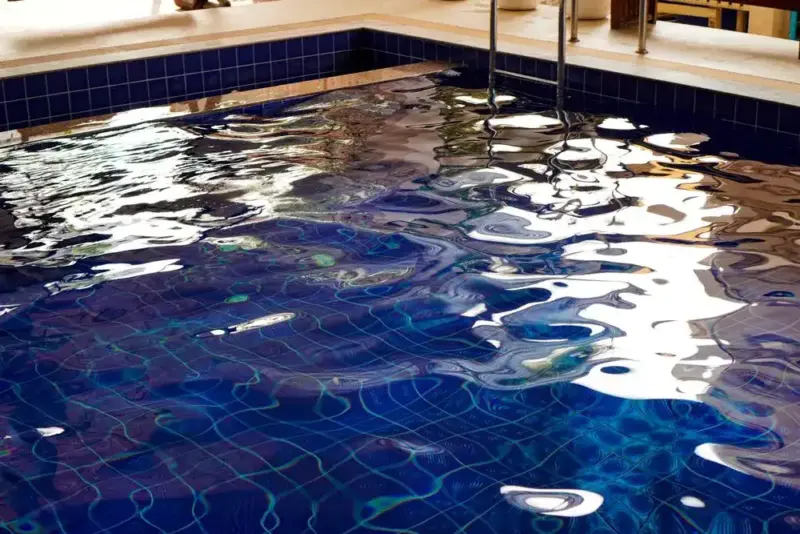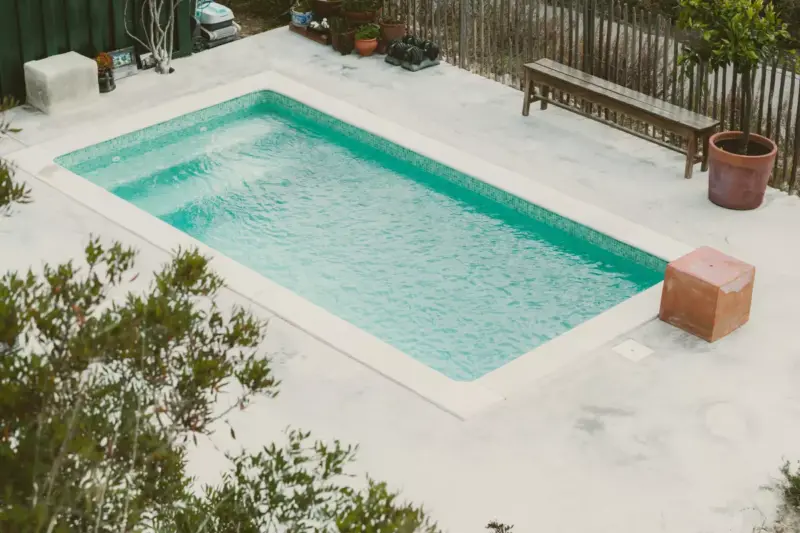
Adding a pool to your backyard is full of exciting decisions, one of the most significant being whether to choose a saltwater oasis or freshwater paradise. As you weigh up saltwater vs freshwater pool options, it’s worth noting that saltwater pools are gaining momentum in Australia, accounting for 75% of new in-ground pools. This trend highlights the importance of understanding what sets these two types of pools apart.
We’ll examine the benefits and drawbacks of saltwater pools and freshwater pools in this guide. Join us as we explore these options, helping you tailor the perfect aquatic retreat for your family’s relaxation and enjoyment.
How Do They Work?
Saltwater and freshwater pools differ in how they are sanitised to keep the water clean and swimmers healthy.
Saltwater pools use a salt chlorinator to convert the salt in the water into chlorine through a process called electrolysis. The chlorinator runs constantly to chlorinate the pool without you having to add anything manually.
Freshwater pools rely on regular manual chlorine tablets or granules dosing to sanitise the water. You need to check chlorine levels yourself and top it up as needed.
While saltwater pools do contain salt, it’s far less than the ocean at around 3,000 parts per million. So you won’t feel sticky or overly salty when swimming.
Saltwater Pools

Saltwater Pool Benefits
Gentler on Eyes and Skin
The smooth chlorination from a saltwater system creates a less harsh swimming experience. There’s no strong chemical smell and less irritation to the eyes and skin than freshwater pools.
Lower Maintenance
With the chlorinator continually working its magic, you don’t have to regularly add chlorine or other chemicals yourself. After the initial cost of installation, saltwater pools are less work to maintain.
Constant Sanitation
Freshwater pools can easily become under or over-chlorinated, leading to contamination and algae buildup. With saltwater pools, chlorination remains steady so the water stays cleaner and safer.
Softer, Silkier Feel
Many swimmers notice the silky feel of saltwater makes for a more soothing and luxurious swimming experience. The water feels ultra-smooth for leisurely laps or playtime fun.
Potential Long-Term Savings
Without the recurring cost of chlorine and other chemicals, saltwater pools can work out cheaper over their lifespan. However the upfront cost of the chlorinator is higher.
Drawbacks of Saltwater Pools
Higher Upfront Cost
Installing a full saltwater chlorination system will add $1,500 to $2,500 to your initial pool building costs depending on the size.
Corrosion Risks
The salt can damage pool equipment like pumps over time if salt levels get too high. You need to use salt-resistant materials and test levels regularly.
Learning Curve
It takes time to master maintaining optimal salt and chlorine levels in a saltwater pool system. For some, this loss of direct control takes adjusting to.
Freshwater Pools

Benefits of Freshwater Pools
Cost-Effective Installation
One of the most appealing aspects of freshwater pools is their lower initial cost. The simpler setup and standard equipment make them a budget-friendly option for many families.
Simplicity in Design and Operation
Freshwater pools typically employ more basic technology compared to saltwater systems. This simplicity can be a significant advantage for those who prefer a no-frills, easy-to-understand pool system.
Chemical Flexibility
Owners of freshwater pools have direct control over the chemicals used. This allows for precise adjustments to suit specific needs, whether it’s accommodating sensitive skin or adjusting for heavy pool usage.
Gentler on Certain Pool Components
Without the corrosive nature of salt, certain pool components in freshwater systems may have a longer lifespan, potentially reducing the need for frequent replacements.
Drawbacks of Freshwater Pools
Ongoing Chemical Maintenance
Freshwater pools require regular chemical monitoring and adjustments. This can be time-consuming, as maintaining the right chlorine balance is crucial for clean and safe water.
Chemical Fluctuations
These pools are more susceptible to fluctuations in chlorine levels, which can lead to algae growth or require additional chemicals to rebalance.
Potential Harshness
The traditional chlorine used in these pools can be harsher on the skin and eyes, often leading to the classic ‘chlorine smell’ and irritation after swimming.
Recurring Chemical Costs
While the upfront cost is lower, the ongoing expense of chemicals can accumulate, impacting the long-term budget for pool maintenance.
Maintenance and Long-Term Costs
A potential pool owner should be familiar with the maintenance requirements of both saltwater and freshwater pools. Regular upkeep not only ensures the longevity and functionality of the pool but also guarantees a safe and enjoyable swimming experience. Each pool water type has its unique maintenance routine, which we will explore below.
Get a Free No Obligation On-Site Consultation Now
Please fill in your details below and we’ll get back to you.
Saltwater Pool Maintenance
Monitor and Adjust Salt Levels
- Regularly check salt levels to ensure the efficient operation of the salt chlorinator.
- Ideal salt concentration: 3,000 to 4,000 ppm (parts per million).
Maintain pH Balance
- It is crucial to keep pH levels between 7.2 and 7.6 for optimal water quality.
Clean the Salt Chlorinator Cell
- Routine cleaning is needed to prevent calcium buildup and maintain efficiency.
General Note
- These tasks are less frequent than those for freshwater pools but vital for smooth operation.
Freshwater Pool Maintenance
Regular Chlorine Addition
- It is essential to add chlorine regularly to maintain water sanitation.
- Keep chlorine levels at 1 to 3 ppm for effectiveness.
Monitor and Adjust pH Balance
- Consistently check and adjust pH levels, ideally between 7.4 and 7.6.
Essential for preventing skin and eye irritation.
Perform Regular Shock Treatments
- Involve adding a hefty dose of chlorine to neutralize bacteria and algae.
- Necessary for maintaining water quality and safety.
General Note
- Maintenance activities are more frequent and proactive compared to saltwater pools.
Conclusion
In summary, whether you choose the silky embrace of a saltwater pool or the classic charm of a freshwater oasis, each brings its unique joys and considerations. As you stand on the brink of this exciting decision, remember that your choice will shape countless moments of joy, relaxation, and family fun.
Now that you’re armed with knowledge about both options, it’s time to take the plunge! Don’t let another summer pass by – contact us today to start crafting your dream pool. Let’s turn your backyard into the ultimate retreat, a place where memories are made and every splash tells a story.





